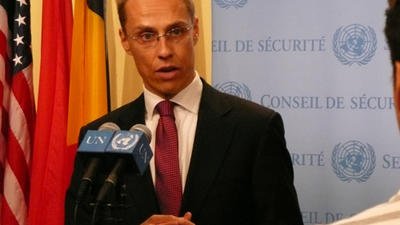-
Our work
-
Fields of work
- Arms control
- Border management
- Combating trafficking in human beings
- Conflict prevention and resolution
- Countering terrorism
- Cyber/ICT Security
- Democratization
- Economic activities
- Education
- Elections
- Environmental activities
- Gender equality
- Good governance
- Human rights
- Media freedom and development
- Migration
- National minority issues
- Policing
- Reform and co-operation in the security sector
- Roma and Sinti
- Rule of law
- Tolerance and non-discrimination
- Youth
- Field operations
- Projects
-
Meetings and conferences
- Summit meetings
- Review Conferences
- Ministerial Council meetings
- Plenary meetings of the Permanent Council
- Plenary Meetings of the Forum for Security Co-operation
- Security Review Conferences
- Annual Implementation Assessment Meetings
- Economic and Environmental Forum
- Economic and Environmental Dimension Implementation Meetings
- Human rights meetings
- Media conferences
- Cyber/ICT security conferences
- Conference of the Alliance against Trafficking in Persons
- Gender equality conferences
- Annual OSCE Mediterranean conferences
- Annual OSCE Asian conferences
- Partnerships
-
Fields of work
-
Countries
- All
-
Participating States
- Albania
- Andorra
- Armenia
- Austria
- Azerbaijan
- Belgium
- Belarus
- Bosnia and Herzegovina
- Bulgaria
- Canada
- Croatia
- Cyprus
- Czechia
- Denmark
- Estonia
- Finland – OSCE Chairpersonship 2025
- France
- Georgia
- Germany
- Greece
- Holy See
- Hungary
- Iceland
- Ireland
- Italy
- Kazakhstan
- Kyrgyzstan
- Latvia
- Liechtenstein
- Lithuania
- Luxembourg
- Malta
- Moldova
- Monaco
- Mongolia
- Montenegro
- The Netherlands
- North Macedonia
- Norway
- Poland
- Portugal
- Romania
- Russian Federation
- San Marino
- Serbia
- Slovakia
- Slovenia
- Spain
- Sweden
- Switzerland
- Tajikistan
- Türkiye
- Turkmenistan
- Ukraine
- United Kingdom
- United States of America
- Uzbekistan
- Asian Partners for Co-operation
- Mediterranean Partners for Co-operation
-
Structures and institutions
- Chairpersonship
-
Secretariat
- Secretary General
- Office of the Secretary General
- Conflict Prevention Centre
- Transnational Threats Department
- Office of the Special Representative and Co-ordinator for Combating Trafficking in Human Beings
- Office of the Co-ordinator of OSCE Economic and Environmental Activities
- Gender Issues Programme
- Opportunities for Youth
- Department of Human Resources
- Department of Management and Finance
- Office of Internal Oversight
- Documentation Centre in Prague
- Institutions
-
Field operations
- Presence in Albania
- Centre in Ashgabat
- Programme Office in Astana
- Programme Office in Bishkek
- Mission to Bosnia and Herzegovina
- Programme Office in Dushanbe
- Mission in Kosovo
- Mission to Moldova
- Mission to Montenegro
- Mission to Serbia
- Mission to Skopje
- Project Co-ordinator in Uzbekistan
- Closed field activities
- Parliamentary Assembly
- Court of Conciliation and Arbitration
- Organizational structure
- About us
Press release
Conflict resolution re-energized, OSCE Chairman tells UN Security Council

- Date:
- Place:
- NEW YORK
- Source:
- OSCE Chairpersonship
- Fields of work:
- Conflict prevention and resolution
NEW YORK, 26 September 2008 - The Organization for Security and Co-operation in Europe is re-energizing its work on conflict resolution and crisis management, the OSCE Chairman-in-Office, Finnish Foreign Minister Alexander Stubb, told the UN Security Council today.
"Recent events highlight the fragility of the rules-based international order that the UN, with the support of the OSCE, strives to build," said Stubb. "The crisis in Georgia has underlined the critical importance of co-operation between the two organizations."
Stubb noted the OSCE had swiftly decided to send an additional 20 Military Monitoring Officers to Georgia and he hoped a deal on deploying a further 80 could still be reached.
He said a new platform involving the UN, the OSCE and the EU, and other stakeholders, should be used for a comprehensive approach to security and stability in South Ossetia and Abkhazia. The October 15 talks in Geneva would be an important step in this direction.
Stubb emphasized to the Security Council that he believed there was no such thing as a 'frozen conflict', adding: "It is time to banish this term from the political lexicon and act quickly to settle outstanding conflicts in our region."
On Kosovo, the Chairman-in-Office said the OSCE's mission - the Organization's largest - was an essential pillar of UNMIK and its role crucial, notably in promoting grassroots democratic values and protecting the interests of all communities.
On Afghanistan, he said the OSCE´s intention was to launch projects related to policing and the fight against drug trafficking to bolster regional stability. The OSCE looks forward to working together with the UN in Afghanistan, Stubb said.
The Security Council meeting was attended by high-level representatives of OSCE participating States, including Russian Foreign Minister Sergei Lavrov and Swedish Foreign Minister Carl Bildt.